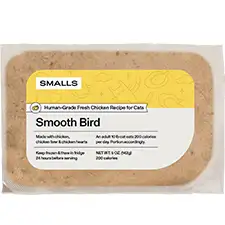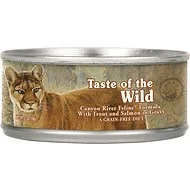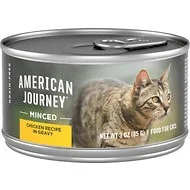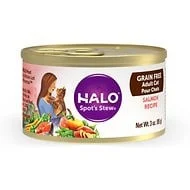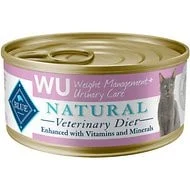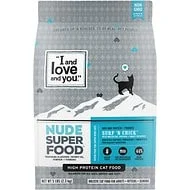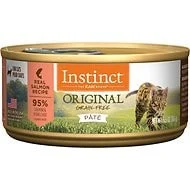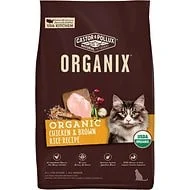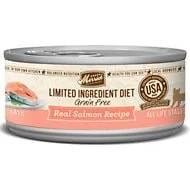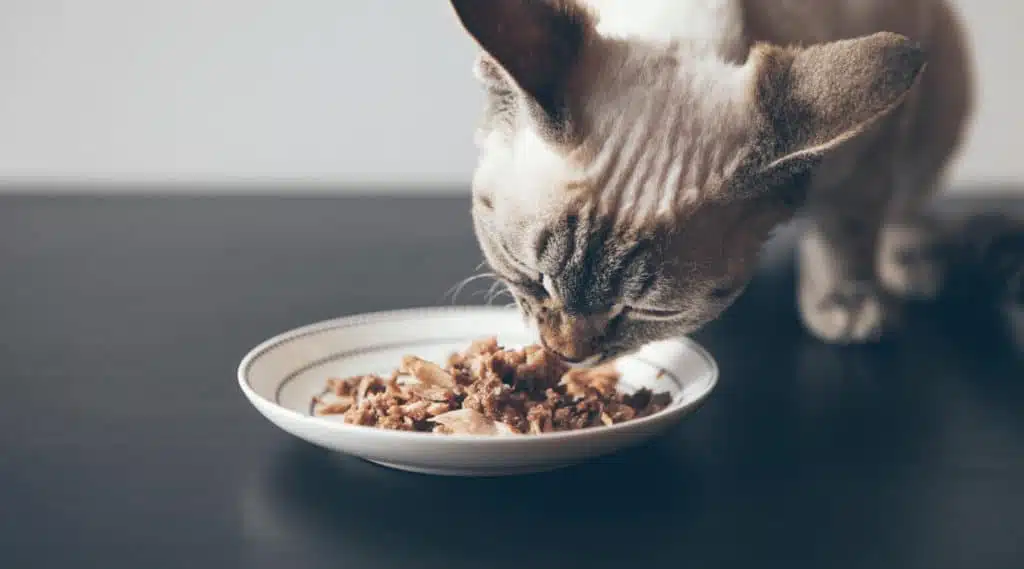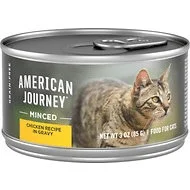9 Best Cat Foods for Congestive Heart Failure in 2025
Quick Guide
- Understanding Common Heart Problems in Cats
- Treating Congestive Heart Failure in Cats
- What to Look for in a Good Cat Food for Congestive Heart Failure
- How Do We Make Our Recommendations?
- The 9 Best Cat Foods for Congestive Heart Failure
- 5 More Top-Rated Cat Foods for Congestive Heart Failure
- Blue Buffalo Natural Veterinary Diet W+U Weight Management + Urinary Care Canned Food
- I and Love and You Super Nude Food Surf ‘n Chick Grain-Free Dry Cat Food
- Instinct by Nature’s Variety Original Grain-Free Real Salmon Recipe Wet Food
- Castor & Pollux Organix Chicken & Brown Rice Recipe Dry Food
- Merrick Limited Ingredient Diet Grain-Free Real Salmon Recipe Canned Food
- Frequently Asked Questions
You may not spend a lot of time thinking about your cat’s heart health, but maybe you should. Early signs of heart disease can be difficult to detect, but prompt diagnosis and treatment is your cat’s best chance for survival. Many forms of heart disease, once advanced, can lead to a serious and life-threatening condition called congestive heart failure.
Once your heart’s ability to properly pump blood becomes compromised, all of his other organs may start working overtime to make up for it. The longer this goes on, the more likely your cat is to develop secondary complications which can further weaken his body. Understanding the basics about heart disease in cats and knowing how to spot it will help you save your cat from having to endure this.
In this article, we’ll explore the different types of feline cardiomyopathy, including their underlying causes and common complications like congestive heart failure. We’ll also take a closer look at congestive heart failure in cats to determine the best medical treatment and to see how a change in diet could help. You’ll also see our top recommendations for the best cat congestive heart failure diet.
| Our 2025 Picks: Overall Best Foods for Congestive Heart Failure | |||
Smalls Fresh Bird Cat Food
|
CHECK PRICE | ||
Taste Of The Wild Canyon River Grain-Free
|
CHECK PRICE | ||
American Journey Minced Chicken Recipe
|
CHECK PRICE | ||
Halo Salmon Recipe Grain-Free Adult Canned Food
|
CHECK PRICE | ||
Blue Buffalo Natural Veterinary Diet W+U
|
CHECK PRICE | ||
I and Love and You Super Nude Food Surf ‘n Chick
|
CHECK PRICE | ||
Instinct by Nature’s Variety Original Grain-Free
|
CHECK PRICE | ||
Castor & Pollux Organix Chicken & Brown Rice
|
CHECK PRICE | ||
Merrick Limited Ingredient Diet Grain-Free
|
CHECK PRICE | ||
Understanding Common Heart Problems in Cats
Heart problems in cats are typically divided into two categories: congenital and adult-onset. Congenital cardiovascular diseases are related to heart defects present when the cat is born and, though some cases show signs when the cat is young, many cases go undetected for years. Adult onset heart disease can occur following damage to the heart or could be linked to another hereditary condition the cat has. In many cases, the exact cause of adult onset cardiovascular disease in cats is unknown.
Though heart disease in cats can be severe, it is less common than it is in dogs. The most common form of heart disease in cats is adult onset hypertrophic cardiomyopathy, characterized by enlargement or thickening of the heart muscle.
Here are some of the most common heart problems seen in cats:
- Hypertrophic cardiomyopathy (HCM)
- Dilated cardiomyopathy (DCM)
- Restrictive cardiomyopathy (RCM)
- Intermediate cardiomyopathy (ICM)
- Congestive heart failure (CHF)
In all types of feline cardiomyopathy, an underlying abnormality in the heart muscle leads to problems with proper heart function. The specific changes in function are related to the type of cardiomyopathy.
With HCM and RCM, the disease affects the heart’s ability to relax between contractions, preventing the heart from filling with blood effectively. This leads to a form of heart failure known as diastolic heart failure. With dilated cardiomyopathy in cats, the disease affects the heart’s ability to contract which also compromises its ability to pump blood. This leads to a form of heart failure known as systolic heart failure. Congestive heart failure develops when the heart loses the ability to effectively pump blood, causing fluid to eventually back up into the cat’s lungs.
In some cases, signs of heart disease develop slowly over the course of months or years. When heart disease is linked to physical trauma or an underlying condition, however, it may develop more quickly.
Here are some of the most common signs of heart disease in cats:
- Vomiting
- Difficulty breathing
- Thromboembolisms (blood clots)
- Depression and isolation
- Poor appetite
- Unexpected weight changes
- Swollen abdomen
- Fainting or collapsing
- Sudden hind leg paralysis
- Weakness or fatigue
- Restlessness
If you notice these symptoms in your cat, you may want to have your vet take a closer look for additional signs of cardiovascular problems. Your vet might check for a heart murmur, a gallop rhythm, abnormal heart rate, or cardiac rhythm disturbance, all of which could indicate cardiomyopathy in cats.
Now that you have a better understanding of common heart problems in cats, let’s take a closer look at congestive heart failure in particular. Read on to learn common cat congestive heart failure symptoms as well as treatment options and how changing your cat’s diet can help.
Treating Congestive Heart Failure in Cats
Congestive heart failure is seen most often in older cats, though it can develop in cats of any age. Because this is a serious disease, detecting the signs early can greatly increase your cat’s survival rate. Congestive heart failure develops when the heart can no longer effectively distribute blood throughout the body. In the early stages, the body adjusts to ensure that organs and tissues get the blood and oxygen they need. As the disease progresses, however, the body’s systems that are already working overtime start to struggle, causing fluid to backup in the body, especially in the lungs.
Here are some of the most common cat congestive heart failure symptoms:
- Lethargy
- Weakness
- Difficulty with exercise
- Coughing
- Labored breathing or panting
- Loss of appetite
- Grey or purple gums
When it comes to congestive heart failure, cat symptoms often appear gradually and can be easy to miss. As the fluid buildup continues, however, your cat’s ability to breathe properly can become compromised and may lead to additional complications.
Diagnosing congestive heart failure in cats usually involves determining whether the cat has an underlying condition contributing to the disease. Things like hypertrophic cardiomyopathy, high blood pressure, hyperthyroidism, heartworm, and anemia are often linked to CHF, as are heart defects and abnormalities in heart rhythm and function. Once your veterinarian determines the underlying condition, treatment can begin.
What to Look for in a Good Cat Food for Congestive Heart Failure
According to some sources, cats with heart disease have no specific dietary requirements as long as they are able to maintain healthy body weight and obtain balanced nutrition. A balanced diet for cats should contain plenty of animal protein with adequate levels of taurine, an important amino acid. Low-sodium diets are unlikely to make much of a difference unless your cat’s heart problems are linked to high blood pressure. You may also want to consider giving your cat dietary supplements for vitamin E and other antioxidants as well as coenzyme Q10. Ask your veterinarian for specific recommendations.
Here are some other general things to look for in a good cat food for congestive heart failure:
- High-quality animal protein (ideally 35% to 40%). Cats are obligate carnivores, so they have a higher biological need for protein in their diets than dogs. Animal proteins are the most biologically valuable and they are complete proteins, meaning that they contain all of the essential amino acids your cat needs including heart-supporting taurine and carnitine.
- Rich in omega-3 fatty acids from animal sources. Omega-3 fatty acids help reduce inflammation and may help protect against abnormal heart rhythm in cats with heart failure. Look for healthy animal-based sources like fatty fish (salmon or salmon oil) as well as plant sources like flaxseed and canola oil. Plant oils can also provide omega-6 fatty acids to balance out the omega-3s.
- Low carbohydrate content with high digestibility. Cats have a limited ability to digest plant products and they have no specific requirements for carbohydrate in their diet. Digestible carbohydrates like whole grains and vegetables can, however, provide valuable nutrition as well as dietary fiber. Just make sure most of the main ingredients in the food are animal-based.
- No artificial additives or by-products. Low-quality ingredients like fillers, by-products, and artificial additives have no nutritional benefit for your cat and should not be in his food. Look for a recipe that contains only natural, whole-food ingredients at the top of the list.
- Beneficial supplements for heart health and balanced nutrition. Vitamin and mineral supplements are required in commercial foods to ensure nutritional balance. You can also look for heart-supporting supplements like taurine, omega-3 fatty acids, carnitine, B vitamins, antioxidants like vitamin E and magnesium. Probiotics (in the form of dried fermentation products) for digestion and improved nutrient absorption wouldn’t hurt either.
Again, only your veterinarian can say what’s best for your cat and his particular case of heart disease. When it comes to cat congestive heart failure, diet is an important factor in maintaining your cat’s ideal body weight and overall health. If you’re still not quite sure what to look for, read on to see our recommendations for the best cat food for congestive heart failure and to see how we made our picks.
How Do We Make Our Recommendations?
Because cats are obligate carnivores, they have a high biological requirement for meat in their diets. A real source of animal protein should be the first ingredient in your cat’s food and, ideally, the main source of fat. Carbohydrates provide limited nutritional value for cats, so any that are included in your cat’s food should be whole-food ingredients and highly digestible. These are some of the key things we look for before recommending a cat food. Complete and balanced nutrition is essential as well, so we also look for recipes fortified with essential vitamins and minerals.
Here are some of the requirements for a cat food to receive our recommendation:
- A source of high-quality animal protein as the first ingredient
- At least 30% crude protein for kittens and at least 26% for adults
- A minimum of 9% crude fat for kittens and adults
- A balance of omega-3 and omega-6 fatty acids, primarily from animal sources
- A rich blend of nutrients from natural sources and supplements, as needed
- Limited carbohydrate content from digestible sources (like whole grains and veggies)
- No low-quality fillers, by-products, or artificial additives (preservatives, dyes, or flavors)
All of our cat food recommendations are made based, first and foremost, on AAFCO food nutrient profiles. These profiles simply outline the minimum nutritional needs of cats in various life stages (kitten or adult). In order to determine whether a cat food meets these requirements, just look for an AAFCO statement of nutritional adequacy on the package. It should look something like this: [X Product] is formulated to meet the nutritional levels established by the AAFCO Cat Food Nutrient Profiles for all life stages. After you have successfully determined that the formula is complete and balanced, you can go on to evaluating its quality.
The 9 Best Cat Foods for Congestive Heart Failure
Follow your veterinarian’s advice if he recommends a prescription diet but don’t be afraid to ask questions. Many prescription diets are made with animal by-products and low-quality grains, so think twice before blindly following your vet’s recommendations. Ask whether a nutritionally balanced cat food made with whole food ingredients might provide the same benefit.
Here are our top picks for the best cat food for congestive heart failure:
Smalls Human-Grade Cat Food Delivery
Overall Best Cat Food for Congestive Heart Failure: If your cat suffers from heart failure, the best thing you can do is feed him a healthy and high quality diet to support his nutrition and help him achieve and maintain ideal body weight. Fresh food is one of the best foods you can feed a cat and Smalls is our favorite fresh pet food brand. All of their recipes are prepared in small batches using premium-quality fresh ingredients and delivered to your door in pre-portioned packages so you simply open the bag and pour it into your cat’s bowl. When you fill out your pet’s profile, you can indicate his weight and age then say whether he needs to gain, lose, or maintain weight. Smalls will calculate his calorie needs accordingly and send you the perfect amount of cat food. Choose from two protein-rich recipes, all complete and balanced for optimal nutrition.
- Pros: Fresh food delivered to your door, premium animal proteins, customized calorie content, complete and balanced nutrition, pre-portioned packages
- Cons: Only two recipes to choose from, significantly more expensive than traditional kibble
Taste of the Wild Rocky Mountain Grain-Free Canned Food
Most Popular Cat Food for Congestive Heart Failure: Because there are so many different cat food brands out there, you may find yourself feeling overwhelmed about choosing the right one. If you’re really not sure what to get, you can always go with a popular, well-trusted brand like Taste of the Wild. We recommend this Rocky Mountain canned food recipe for cats with congestive heart failure because it is rich in animal protein and omega-3 fatty acids but moderate in calories with low carbohydrate content. This formula features fresh salmon as the main ingredient with chicken liver, chicken, and smoked salmon as supplemental proteins. It provides a rich blend of omega-3 and omega-6 fatty acids with fresh fruits and vegetables as antioxidant-rich sources of natural vitamins and minerals. It also contains supplemental B vitamins as well as taurine.
- Pros: High-quality nutrition, rich in animal protein, blend of omega fatty acids, antioxidant-rich fruits and vegetables, complete and balanced, easily digestible, supplemented with taurine
- Cons: Some cats may be sensitive to chicken ingredients
American Journey Salmon and Tuna Recipe in Gravy Grain-Free Canned Food
Most Affordable Cat Food for Congestive Heart Failure: You don’t necessarily need to spend a fortune to feed your cat a healthy and high-quality diet. This American Journey canned food recipe is highly affordable and hits all of the requirements we recommended earlier. As a canned food recipe, this formula is high in protein and low in carbohydrate content, plus it is moisture-rich which helps with digestion. It features fresh salmon as the first ingredient, a quality source of protein that is also rich in omega-3 fatty acids. This recipe contains supplemental protein from chicken liver, tuna, and fresh chicken with fish oil and flaxseed as supplemental sources of omega-3 fatty acid. Fresh fruits provide natural sources for antioxidants with vitamin and chelated mineral supplements to ensure complete and balanced nutrition.
- Pros: Real salmon first ingredient, rich in animal protein, high in omega-3 fatty acids, fresh fruits for antioxidants, chelated mineral supplements, complete and balanced nutrition
- Cons: Main fat ingredients are plant-based (sunflower oil and flaxseed)
Halo Salmon Recipe Grain-Free Adult Canned Food
Best Cat Food for Congestive Heart Failure and Sensitive Stomach: If your cat suffers from heart failure and also has a sensitive stomach, it may be a little tricky to find the right food. Your best bet is a recipe made with a novel source of animal protein and a limited list of ingredients. Though not labeled as a limited ingredient diet, this Halo Salmon Recipe Grain-Free Adult Canned Food contains just 10 main ingredients aside from water and supplements. Salmon is a novel source of protein for many cats as well as a rich source of omega-3 fatty acids. This grain-free recipe contains limited content of digestible grain-free carbohydrates like carrots and peas with salmon oil as the primary source of fat. Overall, it provides complete and balanced nutrition in a diet rich in protein with heart-healthy supplements like taurine, B vitamins, and chelated minerals.
- Pros: Rich in animal protein, digestible grain-free carbohydrates, high omega-3 content, complete and balanced nutrition, heart-healthy supplements, low carbohydrate content, highly digestible
- Cons: Fairly high calorie content (follow feeding recommendations closely)
5 More Top-Rated Cat Foods for Congestive Heart Failure
Blue Buffalo Natural Veterinary Diet W+U Weight Management + Urinary Care Canned Food
Weight management is essential for your cat’s heart health, not to mention his overall health and wellness. If your cat is severely overweight, your veterinarian may recommend a prescription weight control diet. Our top pick is this Blue Buffalo Natural Veterinary Diet W+U Weight Management + Urinary Care Canned Food. Made with all-natural ingredients, this formula is rich in lean animal proteins with a healthy blend of natural fibers to support healthy weight loss and digestive support. It contains numerous heart-supporting supplements as well including vitamin E, chelated magnesium, taurine, and L-carnitine. Plus, as a wet food it is lower in carbs and richer in protein than many dry foods.
I and Love and You Super Nude Food Surf ‘n Chick Grain-Free Dry Cat Food
If your cat prefers dry food, you should look for a recipe that contains a significant amount of animal protein like this Super Nude Food Surf ‘n Chick Grain-Free Dry Cat Food from I and Love and You. This recipe features three premium animal proteins as the first three ingredients with natural sources of omega-3 fatty acid as well. It contains no fillers or by-products and is completely free from artificial additives but does contain beneficial supplements for complete and balanced nutrition. This all-natural recipe is formulated to support your cat’s complete health and wellness with the help of superfoods like chia seeds and green mussels while also promoting healthy digestion and heart health.
Instinct by Nature’s Variety Original Grain-Free Real Salmon Recipe Wet Food
Made with 95% salmon and pork liver with just 5% content of vegetables, fruits, and supplements, this is a complete and balanced recipe that would be healthy for any cat. This Instinct by Nature’s Variety Original Grain-Free Real Salmon Recipe features wild-caught salmon as the main ingredient, a rich source of protein and omega-3s, with flaxseed for additional omega-3 content. It also contains fresh peas and carrots as digestible grain-free carbohydrates and natural sources of essential nutrients. It is still complete and balanced with the help of antioxidant-rich fruits and vegetables, supplemented with vitamins and chelated minerals as needed.
Castor & Pollux Organix Chicken & Brown Rice Recipe Dry Food
Another healthy dry food option for your cat is this Castor & Pollux Organix Chicken & Brown Rice Recipe. It features fresh organic chicken and organic chicken meal as the top two ingredients with digestible whole-grain carbohydrates like organic oatmeal, barley, and brown rice. This formula contains plenty of omega-3 fatty acids balanced with omega-6s and supplements to benefit your cat’s heart like B vitamins and taurine. This recipe is complete and balanced, plus it is supplemented with probiotics to boost your cat’s digestion and help optimize his nutrient absorption.
Merrick Limited Ingredient Diet Grain-Free Real Salmon Recipe Canned Food
To maximize your cat’s nutrition while minimizing the risk for food allergies, consider a limited ingredient recipe like this Merrick Limited Ingredient Diet Grain-Free Real Salmon Recipe Canned Food. It features fresh salmon as the main ingredient, a rich source of protein and omega-3 fatty acids. It also contains salmon oil for additional omega-3s with other heart-supporting supplements like B vitamins and taurine. This recipe is highly digestible and very low in carbohydrates but still complete and balanced with the help of vitamin and chelated mineral supplements. It is a moderate-calorie recipe rich in moisture to boost your cat’s healthy digestion while helping him maintain an ideal body weight.
Frequently Asked Questions
- Are some cats more prone to heart disease? Any cat can develop heart disease if born with a heart abnormality. There are, however, certain breeds which are predisposed to certain types of heart disease. The Maine Coon is prone to hypertrophic cardiomyopathy and a recent study showed that 33% of cats of this breed had a genetic abnormality that was related to the disease. Persian cats also have a high incidence for the disease and both American and British shorthairs are prone to a less severe form of hypertrophic cardiomyopathy. Siamese cats are prone to patent ductus arteriosus (PDA) as well as dilated cardiomyopathy.
- Do grain-free diets cause heart disease in cats? Over the past year or two, there have been concerns about a potential link between grain-free commercial pet foods and an increased risk of heart disease in pets. Numerous accounts of dilated cardiomyopathy have been noted in dogs being fed grain-free diets, particularly in breeds and sizes that are not typically prone to the disease. The FDA is currently performing a more in-depth investigation to determine whether the link is clear. Though a few cats have been listed in the report, the problem seems to be more common in dogs. Cats require higher protein levels in their diets, ideally from animal sources. Commercial foods high in plant proteins are less biologically valuable, though it is unclear whether they can be linked to developing heart problems. Read the FDA’s report here.
- How long do cats live with cardiomyopathy? When it comes to feline cardiomyopathy, life expectancy varies among the different types. Cats with hypertrophic cardiomyopathy are prone to blood clots and if one develops, their situation could be dire. Even when the cat survives the first 24 hours, their prognosis is another 2 to 6 months. All forms of cardiomyopathy in cats are serious and could affect the cat’s lifespan. When it comes to cat congestive heart failure, life expectancy is only 6 to 18 months because severe damage to the heart has already been done and treatment may not be able to reverse it.
- Is heart disease painful for cats? There are a number of different types of heart disease that affect cats, each with a unique array of symptoms. For the most part, symptoms in the early stages are not painful and may not even be easy to spot. As the condition worsens, however, your cat’s heart function could become impaired and that may lead to more severe and potentially painful symptoms. With certain forms of heart disease, there is a risk for a painful and paralyzing condition called saddle thrombus in which a blood clot develops in the heart and moves out of the aorta to lodge in the saddle. This can lead to hind leg paralysis.
- What should you feed a cat with heart disease? There is no single “best” diet for cats with heart disease because medical and dietary recommendations vary depending on the type of heart disease your cat has. Generally speaking, you should look for a recipe that will help your cat maintain lean muscle mass and an ideal body weight to prevent putting extra strain on the heart. Some level of sodium restriction may be recommended depending on the stage of heart disease and nutritional supplements should be included to ensure that your cat gets balanced nutrition to avoid nutritional deficiencies. Certain supplements may also be beneficial for heart function like taurine, omega-3 fatty acids, antioxidants, and co-enzyme Q10.
Heart failure in cats is a serious concern, so take your cat to the vet at the very first sign of symptoms. With your vet’s help, you can diagnose your cat with a specific form of feline cardiomyopathy or another underlying heart problem and start treatment before it develops into congestive heart failure. If your cat has already developed CHF, you should follow your veterinarian’s advice to keep your cat healthy and comfortable for as long as possible.
When it comes to managing feline congestive heart failure, diet plays an important role in keeping your cat healthy and well. Your vet may recommend a prescription diet, depending how advanced the case is, or you might simply want to look for a heart-healthy diet that will help your cat obtain the balanced nutrition he needs while maintaining proper body weight and condition. If you’re not sure where to start looking for the best cat food for congestive heart failure, try one of our recommendations above.


